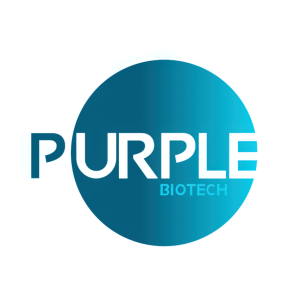Purple Biotech Reports Final Data from Phase 2 Study of CM24 in Pancreatic Cancer Patients at AACR 2025 Annual Meeting: Improved Outcomes and Significant Efficacy in Biomarker-Enriched Subgroups
Rhea-AI Summary
Purple Biotech announced final data from its Phase 2 study of CM24 in pancreatic cancer patients at AACR 2025. The study showed significant efficacy in biomarker-enriched subgroups, with up to 90% reduction in death risk in specific patient populations.
Key findings include:
- 78% reduction in death risk for patients with specific CEACAM1 ranges
- 61% reduction in death risk for patients with defined CEACAM1 or MPO levels
- 90% reduction in death risk for patients with high tumor CEACAM1 and low PD-L1 CPS
The combination therapy of CM24, nivolumab, and chemotherapy was well-tolerated and showed improvements in all efficacy measures. The study identified CEACAM1 as a potential biomarker, both in serum and tumor tissue. Based on these results, Purple Biotech plans to conduct a biomarker-driven Phase 2b study, potentially expanding into gastric and biliary tract cancer treatments.
Positive
- 78% reduction in risk of death in CEACAM1 biomarker subgroup, showing strong efficacy
- 90% reduction in risk of death in high tumor CEACAM1/low PD-L1 CPS subgroup
- Higher objective response rate in treatment arm (25%) vs control (6.7%)
- Higher disease control rate in treatment arm (62.5%) vs control (46.7%)
- Well-tolerated treatment combination showing improved outcomes across all efficacy parameters
- Biomarker identification enables targeted patient selection for future trials, potentially increasing success rates
Negative
- Results limited to small subgroups (31 patients total, with even smaller biomarker subgroups)
- Without biomarker consideration, overall survival improvement was not statistically significant (p=0.575)
- Additional Phase 2b study required before potential commercialization, extending timeline and costs
- Treatment only effective in specific biomarker-defined patient populations, limiting market potential
News Market Reaction
On the day this news was published, PPBT declined 5.16%, reflecting a notable negative market reaction.
Data tracked by StockTitan Argus on the day of publication.
- Statistically significant efficacy in biomarker subgroup analyses was observed:
-
78% reduction in risk of death and81% reduction in risk of progression or death in defined pretreatment ranges of serum or tumor CEACAM1 subgroup61% reduction is risk of death and72% reduction in risk of progression or death in defined pretreatment ranges of serum CEACAM1 or myeloperoxidase (MPO) subgroup90% reduction is risk of death and81% reduction in risk of progression or death in high tumor CEACAM1 and low PD-L1 combined positive score (CPS) subgroup
- The biomarkers identified in the Phase 2 study are planned to be used for patient selection in the next Phase 2b study
REHOVOT, Israel, April 30, 2025 (GLOBE NEWSWIRE) -- Purple Biotech Ltd. ("Purple Biotech" or "the Company") (NASDAQ/TASE: PPBT), a clinical-stage company developing first-in-class therapies that seek to overcome tumor immune evasion and drug resistance, announced today that a poster presentation titled “Final analysis of the randomized Phase 2 cohort of CM24 with nivolumab and chemotherapy in pancreatic cancer & potential serum biomarkers” is being presented during the session “Liquid Biopsy: Circulating Nucleic Acids 4 / Predictive Biomarkers 1” at the Annual Meeting of the American Association of Cancer Research (AACR 2025) on Wednesday, April 30, 2025.
“These statistically significant biomarker results, with up to a
At AACR 2025, Purple Biotech presented final data from its randomized, controlled, open-label, multicenter Phase 2 study (NCT04731467), which established proof of concept in a biomarker-enriched subgroup of 31 patients with advanced/metastatic pancreatic ductal adenocarcinoma (PDAC) who were post-first line therapy, and compared treatment with CM24 + nivolumab + Nal-IRI/5FU/LV against treatment with Nal-IRI/5FU/LV alone.
The following is a summary of the findings.
The combination of CM24, nivolumab and Nal-IRI/5FU/LV chemotherapy was well tolerated and demonstrated quantitative improvement in all efficacy parameters, including OS, PFS, objective response rate (ORR), disease control rate (DCR) and CA19-9, in previously treated PDAC patients.
Without consideration of biomarkers, a consistent improvement in the treatment arm compared to the control arm was observed, as follows:
- Prolongation of 2.4 months in OS HR=0.81 (p-0.575) and prolongation of 1.9 months in PFS HR=0.75 (p=0.463) vs. control arm
- Higher ORR in experimental arm vs control arm (
25% vs6.7% ) - Higher DCR in experimental arm vs control arm (
62.5% vs46.7% ) - Consistent and continuous decrease in CA19-9 was observed in experimental arm vs control arm increase
Biomarker results included the following:
A statistically significant benefit to patients with defined pre-treatment ranges of serum CEACAM1 or tumor CEACAM1 expression (H score) compared to the control arm (representing a subgroup of
-
- Subgroup analyses of 16/31 patients meeting the criteria of CEACAM1+Tumor cell H score 115-275 or serum CEACAM1 levels 6K-15K pg/mL
78% reduction in risk of death (HR 0.22,95% CI 0.07-0.7, p=0.006) and95% reduction in the risk of progression or death (HR 0.05,95% CI 0.01-0.44, p=0.0003)- Prolongation of 3.7 months in OS and 2.9 months in PFS
Statistically significant results in patients with defined pre-treatment serum CEACAM1 or myeloperoxidase (MPO) levels (representing a subgroup of
-
- Subgroup analyses for 24/30 patients meeting the criteria of MPO levels 200-600 ng/mL or serum CEACAM1 levels 6K-15K pg/mL
61% reduction in risk of death (HR = 0.39,95% CI 0.16-0.98, p=0.039) and72% reduction in the risk of progression or death (HR=0.28,95% CI 0.11-0.73, p=0.006)- Prolongation of 2.4 months in OS and 2.2 months in median PFS
A statistically significant benefit for CM24-nivolumab treatment in patients with high CEACAM1+Tumor cell H score and low PD-L1 CPS (representing a subgroup of
-
- Subgroup analyses of 10/26 patients meeting the criteria of high CEACAM1+Tumor cell H score ≥ 115 and Low CPS ≤ 1 (
90% reduction in risk of death (HR = 0.1,95% CI 0.01-0.89, p=0.013) and81% reduction in the risk of progression or death (HR = 0.19,95% CI 0.04-1.02, p=0.033)- Prolongation of 4 months in OS and 2 months in PFS
“The identification of CEACAM1 as a potential biomarker, both in serum and at the tumor, corresponds with the multi-faceted function of CEACAM1, as part of the neutrophil extracellular trap (NET) structure affecting NET-related tumor immune evasion, metastasis and other cancer-associated complications, such as thrombosis, at the level of the whole body, as well as modulation of the tumor microenvironment (TME)," stated Purple Biotech VP of Research and Development, Dr. Hadas Reuveni. "Targeting CEACAM1 by CM24 suggests a potential new approach that may address tumor-associated mechanisms affecting the patient at the levels of the tumor, the TME and the whole body. The biomarker data accumulated in this clinical study may help us to direct the treatment of patients who might have a higher chance to benefit from the treatment and could expand our understanding of CEACAM1 and NETs in cancer biology.”
Final conclusions from the study:
- The combination of CM24, nivolumab, and Nal-IRI/5FU/LV chemotherapy was well tolerated and
demonstrated quantitative improvement in all efficacy parameters, including OS, PFS, ORR and CA19-9, in previously treated PDAC patients.
- Based on post-hoc analyses - serum CEACAM1 and MPO, a NET marker, are demonstrated as potential predictive biomarkers for CM24-based therapy, consistent with its mechanism of action (MoA) in targeting CEACAM1 to modulate immune evasion and NET activities.
- Results imply that both serum and tumor CEACAM1 levels are potential predictive biomarkers for CM24 based therapy, suggesting multifaceted MoA and the crosstalk of the tumor with the TME and the whole body.
- Improved outcome in patients with high tumor CEACAM1 expression and low PD-L1 CPS further support the mechanistic rationale of the CM24/nivolumab combination and highlight its potential in disease settings where immuno-oncology is less effective.
“The design of the randomized trial enabled us to evaluate the benefit of CM24 and nivolumab in combination with standard of care chemotherapy and to analyze potential biomarker data to better prepare for the next study.” stated Purple Biotech Head of Clinical and Regulatory Affairs, Dr. Michael Schickler. "We currently expect the design of the next Phase 2b study to include an additional group testing CM24 alone in combination with standard of care with patients selected based on the identified biomarkers, potentially in indications such as gastric and/or biliary tract cancer, in addition to PDAC.”
The poster will be available at the Publication section on Purple Biotech’s website following its presentation at the conference.
About Purple Biotech
Purple Biotech Ltd. (NASDAQ/TASE: PPBT) is a clinical-stage company developing first-in-class therapies that seek to overcome tumor immune evasion and drug resistance. The Company's oncology pipeline includes CM24, NT219, and CAPTN-3. CM24 is a humanized monoclonal antibody that blocks CEACAM1, which supports tumor immune evasion and survival through multiple pathways. CEACAM1 on tumor cells, immune cells and neutrophil extracellular traps is a novel target for the treatment of multiple cancer indications. As proof of concept of these novel pathways, the Company completed a Phase 2 study for the treatment of pancreatic ductal adenocarcinoma (PDAC) with CM24 as a combination therapy with the anti-PD-1 checkpoint inhibitor nivolumab and chemotherapy, demonstrating clear and consistent improvement across all efficacy endpoints and the identification of two potential serum biomarkers. NT219 is a dual inhibitor, novel small molecule that simultaneously targets IRS1/2 and STAT3. A Phase 1 dose escalation study was concluded as a monotherapy and in combination with cetuximab, in which NT219 demonstrated anti-tumor activity in combination with cetuximab in second-line patients with recurrent and/or metastatic squamous cell carcinoma of the head and neck (R/M SCCHN). The Company is advancing NT219 into a Phase 2 study in collaboration with the University of Colorado, to treat R/M SCCHN patients in combination with cetuximab or pembrolizumab. The Company is advancing CAPTN-3, a preclinical platform of conditionally activated tri-specific antibodies, which engage both T cells and NK cells to induce a strong, localized immune response within the tumor microenvironment. The cleavable capping technology confines the compound's therapeutic activity to the local tumor microenvironment, thereby potentially increasing the anticipated therapeutic window in patients. The third arm specifically targets the Tumor Associated Antigen (TAA). The technology presents a novel mechanism of action by unleashing both innate and adaptive immune systems to mount an optimal anti-tumoral immune response. IM1240 is the first tri-specific antibody in development that targets the 5T4 antigen, which is expressed in a variety of solid tumors and is associated with advanced disease, increased invasiveness, and poor clinical outcomes. The Company's corporate headquarters are located in Rehovot, Israel. For more information, please visit https://purple-biotech.com/.
Forward-Looking Statements and Safe Harbor Statement
Certain statements in this press release that are forward-looking and not statements of historical fact are forward-looking statements within the meaning of the safe harbor provisions of the Private Securities Litigation Reform Act of 1995. Such forward-looking statements include, but are not limited to, statements that are not statements of historical fact, and may be identified by words such as "believe", "expect", "intend", "plan", "may", "should", "could", "might", "seek", "target", "will", "project", "forecast", "continue" or "anticipate" or their negatives or variations of these words or other comparable words or by the fact that these statements do not relate strictly to historical matters. You should not place undue reliance on these forward-looking statements, which are not guarantees of future performance. Forward-looking statements reflect our current views, expectations, beliefs or intentions with respect to future events, and are subject to a number of assumptions, involve known and unknown risks, many of which are beyond our control, as well as uncertainties and other factors that may cause our actual results, performance or achievements to be significantly different from any future results, performance or achievements expressed or implied by the forward-looking statements. Important factors that could cause or contribute to such differences include, among others, risks relating to: the plans, strategies and objectives of management for future operations; product development for NT219, CM24 and IM1240; the process by which such early stage therapeutic candidates could potentially lead to an approved drug product is long and subject to highly significant risks, particularly with respect to a joint development collaboration; the fact that drug development and commercialization involves a lengthy and expensive process with uncertain outcomes; our ability to successfully develop and commercialize our pharmaceutical products; the expense, length, progress and results of any clinical trials; the impact of any changes in regulation and legislation that could affect the pharmaceutical industry; the difficulty in receiving the regulatory approvals necessary in order to commercialize our products; the difficulty of predicting actions of the U.S. Food and Drug Administration or any other applicable regulator of pharmaceutical products; the regulatory environment and changes in the health policies and regimes in the countries in which we operate; the uncertainty surrounding the actual market reception to our pharmaceutical products once cleared for marketing in a particular market; the introduction of competing products; patents obtained by competitors; dependence on the effectiveness of our patents and other protections for innovative products; our ability to obtain, maintain and defend issued patents; the commencement of any patent interference or infringement action against our patents, and our ability to prevail, obtain a favorable decision or recover damages in any such action; and the exposure to litigation, including patent litigation, and/or regulatory actions, and other factors that are discussed in our Annual Report on Form 20-F for the year ended December 31,2024 and in our other filings with the U.S. Securities and Exchange Commission ("SEC"), including our cautionary discussion of risks and uncertainties under "Risk Factors" in our Registration Statements and Annual Reports. These are factors that we believe could cause our actual results to differ materially from expected results. Other factors besides those we have listed could also adversely affect us. Any forward-looking statement in this press release speaks only as of the date which it is made. We disclaim any intention or obligation to publicly update or revise any forward-looking statement or other information contained herein, whether as a result of new information, future events or otherwise, except as required by applicable law. You are advised, however, to consult any additional disclosures we make in our reports to the SEC, which are available on the SEC's website, https://www.sec.gov.
CONTACTS:
Company Contact:
IR@purple-biotech.com








